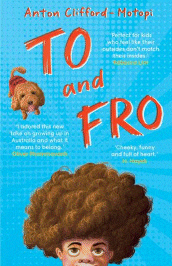
To and Fro
To and Fro
Anton Clifford-Motopi
A&U Children’s, 2024
304pp., pbk., RRP $A17.99
9781761180378
For twelve years, it has just been Sam, his mum and his Nanna (and Grandad when he was alive) and Sam has been okay with that. He has survived his mum’s cooking, passion for second-hand things and dreadful driving; he visits his nanna often and copes with her religious beliefs, ornaments on every surface and gallery of photos of dead people on the mantelpiece; he fits in well at his school, has friends although they make fun of his Afro haircut especially Lachlan Bott, manages to rub along with his teacher Mr Peacock whose antics mimic his name and like most in Year 6, is counting down the days till primary school is over. He has a dog called Trevor who has a haircut similar to his own, and altogether, he is just like everyone else he knows.
He has never met his dad although he knows he was a Black African who apparently left his mother when she was pregnant, and even that is unremarkable these days when family structures are so diverse. But what he is not ready for is his dad suddenly appearing in his life, and his having to make the decision about whether he will meet him with all the ramifications that that will have.
Most kids meet their parents when they’re born. All they need to do to impress them is poop, sleep and make goo-goo ga-ga sounds. But I’m twelve. None of that is going to impress my father.
And given that Mr Peacock has set the class a major investigation into “who am I and where do I come from?’ so Sam’s focus is already on his origins, it is a dilemma that only he can decide. He does go ahead with the meeting but that just sets up more questions than answers – deep-seated questions that will shape his identity – but which provoke a lot of turmoil within and without. Is he a white kid with a black dad? Or a black kid with white skin? Or half-black and half-white? How can he make his outside match his insides if he doesn’t know who he is?
This is an engaging novel for independent readers, many of whom may find themselves in Sam’s predicament whether the conflict be based on race, culture, religion, gender or something else. As kids move through puberty, even those in the most “standard” of families, question who they are as they try to find and establish their place as independent individuals in the scheme of things, so it is going to have broad appeal. Told by Sam himself, and being somewhat akin to the author’s own experience, the reader is drawn into Sam’s confusion from his perspective, rather than that of a narrator imposing their interpretation. It’s funny, has a certain amount of toilet humour that appeals to the age and gives it authenticity, but more than anything, it is a compelling read that tackles deeper issues than just constructing a family tree because it takes that to the next level of looking at the relationships on it and their impact on the current generation.
While many modern stories for that upper end of primary often feature fantastic creatures, superheroes and good vs evil in some shape or form, my experience is that these readers also love contemporary realistic fiction like this – stories where they see themselves or put them in a position of asking what would they do, giving them an opportunity to work through genuine life issues at arm’s length. They like being respected as intelligent, thoughtful readers, and through both the characters and the storyline of this one, the author has nailed it.